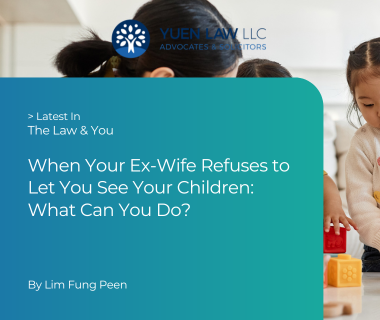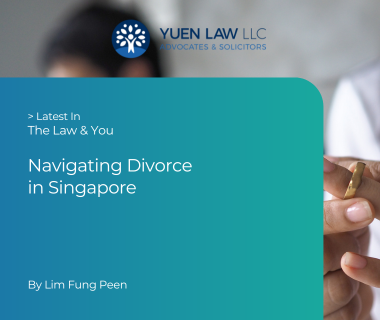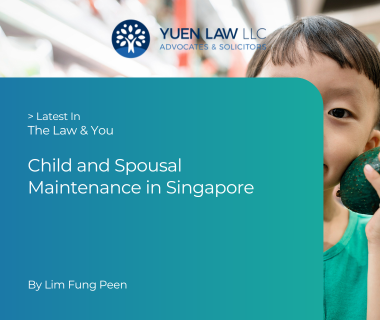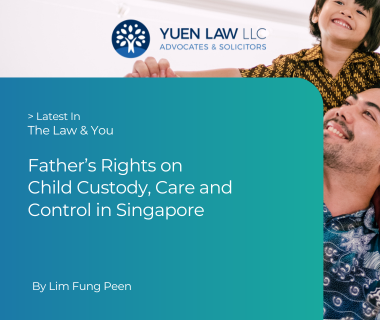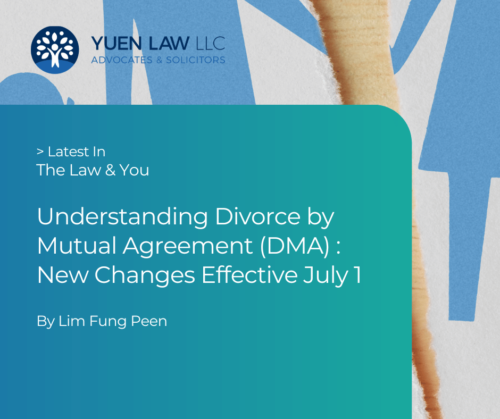For parents going through a divorce, matters pertaining to children are often the most important and the biggest point of contention. Section 122 of the Women’s Charter defines a “child” as a child of a marriage who is below the age of 21 years.

Paramount Consideration is the Welfare of the Child
In any proceeding relating to a child, the court will regard the welfare of the child to be the paramount consideration. This can be broadly understood to encompass not only the child’s physical comfort but also his moral, religious, emotional and mental well-being.
Child Custody
The parent awarded with custody is empowered to make major and long-term decisions regarding all aspects of the upbringing of the child. These include decisions pertaining to education, religion and healthcare of the child.
Non-exhaustive factors that a judge may consider in determining who to grant the custody order to include:
- (a) The need for both parents to be involved in the child’s life;
- (b) Parental bonds with the child;
- (c) The child’s wishes and needs;
- (d) The desirability of keeping siblings together;
- (e) The ability of each parent to provide for the child’s needs; or
- (f) The impact of change and need for stability.
Where necessary, the court may order for Custody Evaluation Reports to resolve custody disputes.
When a custody order is in force, only the custodial parent can take the child out of the country. A non-custodial parent may take the child out of the country only with the consent of the custodial parent or the leave of court. In any event, both parents must agree to the child being taken out of the country if it is for more than one month.
Sole Custody Order
A sole custody order grants one parent with the authority to make major decisions for the child.
A sole custody may be ordered in exceptional circumstances, where one parent physically, sexually, or emotionally abuses the child, or where the relationship of the parties is such that cooperation is impossible even after avenues of mediation and counselling have been exhausted, and the lack of co-operation is harmful to the child. Such an order may be varied where the parent who was denied custody has demonstrated a capability of acting responsibly.
Joint Custody Order
A joint custody order allows both parents to have equal authority to make major decisions concerning the child. Even if there is some degree of acrimony between the parties, joint custody can still be ordered.
This order is most common in Singapore as the courts recognise that it is generally in the best interests of any child to have both parents involved in his or her life for the entirety of his or her childhood even after a divorce. Further, joint custody signals to both parents that neither has a greater right over the child and both have a responsibility to act in the best interests of the child.
Hybrid Custody Order
A hybrid custody order grants one parent custody over the child. Nonetheless, the parent with custody must still consult the non-custodial parent on matters pertaining to the welfare of the child.
Split Custody Order
A split custody order grants custody of one or more siblings to one parent, and custody of other siblings to the other parent. Such an order is uncommon as the courts in Singapore would typically allow siblings to stay together to provide one another with mutual support and emotional strength.
Care and Control of Child
Unlike a custody order, a care and control order relates to the upbringing of the child on a daily basis and determines which parent the child will live with. The parent with care and control will be the child’s primary caregiver and is in charge of his or her day-to-day matters like meals, school activities and transport arrangements. Such an order is necessary when parents live separately.
In most cases in Singapore, care and control is given to mothers. In exceptional cases where the mother is found to be abusive or neglectful, the mother consents to the father’s request for care and control, or the child is at an age where he or she can clearly express his or her wishes to stay with the father, the court may award care and control to the father.
In the alternative, fathers who wish to possess care and control of the child may pursue a shared care and control order where time spent with the child will be split equally between both parents. To succeed, the father must have been the primary caregiver of the child during the marriage. Such an arrangement must also be feasible and in the best interest of the child.
In determining what is in the best interests of the child, the judge may request for Social Welfare Reports or counselling sessions to determine what type of order is suitable for the child and the parents.
Access to Child
Access orders pertain to arrangements made between the parents for meetups with the child and access is granted to the parent who is not given care and control of the child.
In determining the duration of access, the court will determine what is considered a fair and reasonable amount of time. Typical access periods are weekday access, weekend access, school holiday access, and public holiday access.
Non-exhaustive factors that a judge may consider in determining the duration of access include:
- (a) The child’s needs;
- (b) The child’s wishes; or
- (c) The parent-child relationship.
Access orders may be unsupervised or supervised. Unsupervised orders are more common and allow the parent to spend time with the child without third-party supervision over the meetup. Supervised orders are given where there is a need to protect the child from potential physical or emotional abuse, or to observe and assess the relationship between the child and the parent.
Parents are encouraged to reach a common ground over access arrangements amongst themselves. Where necessary, the court may order for Access Evaluation Reports to resolve disputes over access issues. Ultimately, the court will determine which arrangement is in the best interest of the child.


